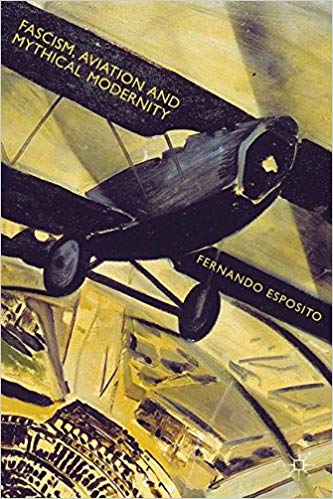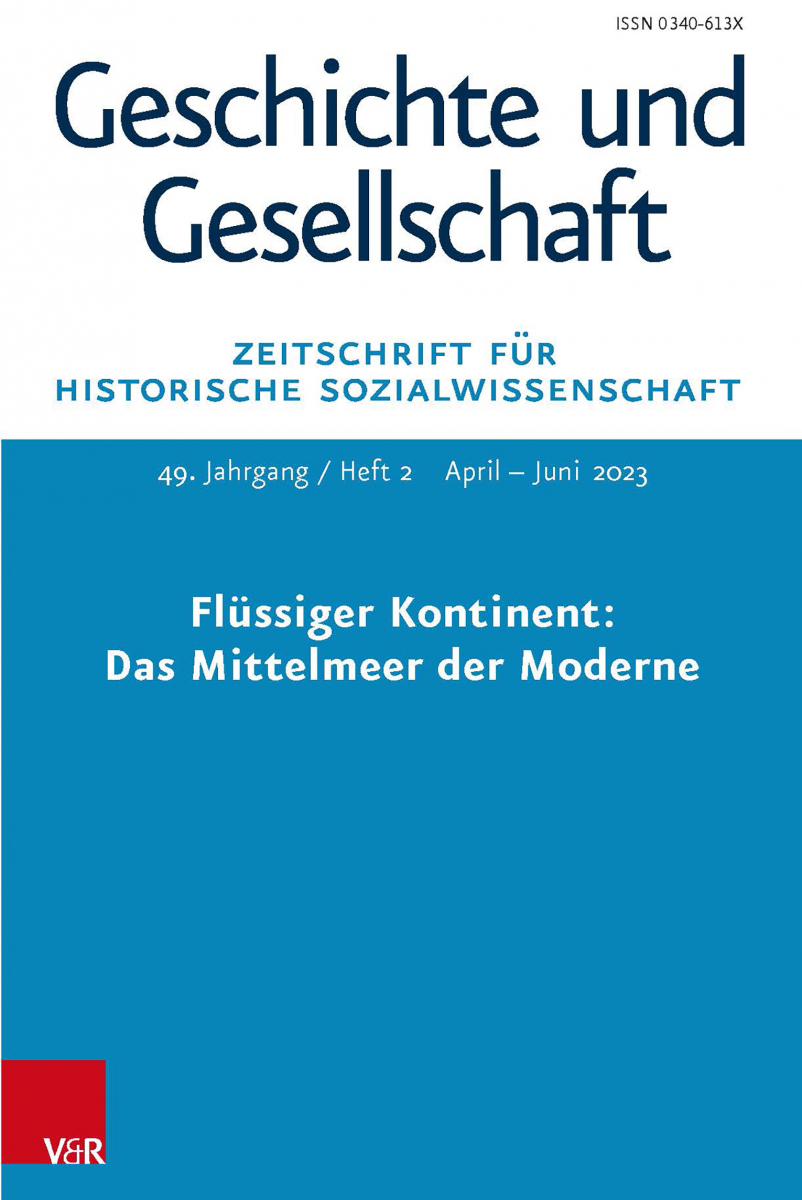Address:
Room E 315
University of Konstanz
Modern and Contemporary History
P. O. Box 6
Universitätsstraße 10
Phone: 07531/88-2470
Email: fernando.esposito@uni-konstanz.de
Winter term 2024/25 and Summer term 2025:
Fernando Esposito represents the Chair of Modern and Contemporary History at the University of Münster from 1 October 2024 to 30 September 2025.
Research Foci
- History and theories of historical times
- Fascism
- Modernism
- The histories of Germany andf Italy in the 19th and 20th centuries
- The Mediterranean in the 19th and 20th centuries
- New history of ideas
Research projects
Die Gleichzeitigkeit des Ungleichzeitigen. Ein Beitrag zur Geschichte und Theorie historischer Zeiten zwischen Spätaufklärung und Posthistoire
Beschreibung des Habilitationsprojekts siehe hier
Von no future bis Posthistoire. Der Wandel des temporalen Imaginariums nach dem Boom.
Beschreibung des Postdoc-Projekts <link>siehe hier
Mythische Moderne. Aviatik, Faschismus und die Sehnsucht nach Ordnung in Deutschland und Italien.
Beschreibung der abgeschlossenen Dissertation siehe hier.
Publications
Monographs
Fascism, Aviation and Mythical Modernity, Basingstoke 2015. [English edition of Mythische Moderne]; reviews in: American Historical Review; English Historical Review; Journal of Modern History; Journal of Modern Italian Studies.
Mythische Moderne. Aviatik, Faschismus und die Sehnsucht nach Ordnung in Deutschland und Italien, Munich 2011; reviews in: Fascism; HSozKult; HZ; NPL; Technikgeschichte; ZIG; Interview mit Alexander Kluge bei "10vor11"
Edited volumes
together with Manuel Borutta: Flüssiger Kontinent. Das Mittelmeer der Moderne. Special issue von Geschichte und Gesellschaft 49.2 (2023).
together with Tobias Becker: Chronopolitics: Time of Politics, Politics of Time, Politicized Time. Special issue von History and Theory 62.4 (2023).
together with Nora Binder, Aaron Pinnix und Axel Volmar: Rethinking Infrastructure Across the Humanities, Bielefeld 2023.
together with Julia Angster, Eckart Conze and Silke Mende: Doering-Manteuffel, Anselm: Konturen von Ordnung. Ideengeschichtliche Zugänge zum 20. Jahrhundert, Munich 2019.
Zeitenwandel. Transformationen geschichtlicher Zeitlichkeit nach dem Boom, Göttingen 2017. Reviews in: German History; HSozkult; sehepunkte.
Fascist Temporalities. Special issue of the Journal of Modern European History 13.1 (2015).
Essays
Das Nachdenken über das „Ende der Geschichte“, in: Beisbart, Claus u.a. (eds.), Das Ende denken. Vom menschlichen Umgang mit Schlusspunkten, Frankfurt a.M./New York 2024, pp. 241–262.
The “Museum of Humanity,” or How Historicism Gave Rise to the Mediterranean Chronotope, in: Geschichte und Gesellschaft 49 (2023), pp. 325–352.
together with Manuel Borutta: Flüssiger Kontinent. Das Mittelmeer der Moderne, in: Geschichte und Gesellschaft 49 (2023), pp. 163–202.
Peasants, Brigands, and the Chronopolitics of the New Leviathan in the Mezzogiorno, in: History and Theory 62 (2023), pp. 24-44.
together with Tobias Becker: The Time of Politics, the Politics of Time, and Politicized Time: An Introduction to Chronopolitics, in: History and Theory 62 (2023), pp. 3-23.
Imperial Roads and the Fascist Culture of Total Mobilization, in: Pinnix, Aaron/Volmar, Axel/Esposito, Fernando/Binder, Nora (Editors): Rethinking Infrastructure Across the Humanities, Bielefeld 2023, pp. 259-268.
together with Nora Binder, Aaron Pinnix und Axel Volmar: Introduction, in: Pinnix, Aaron/Volmar, Axel/Esposito, Fernando/Binder, Nora (Editors): Rethinking Infrastructure Across the Humanities, Bielefeld 2023, pp. 11-29.
Gegenwärtige Vergangenheit. Zum Wandel geschichtlicher Zeitlichkeit im letzten Drittel des 20. Jahrhunderts, in: Febel, Gisela/Kerth, Sonja/Lienert, Elisabeth (Hrsg.): Wider die Geschichtsvergessenheit. Inszenierte Geschichte – historische Differenz – kritisches Bewusstsein, Bielefeld 2022, pp. 19-37.
Die „Neue Zeit“ und die römische Zukunft. Der italienische Faschismus, in: Seefried, Elke (Hrsg.): Politische Zukünfte im 20. Jahrhundert, Frankfurt a.M. u.a. 2022, pp. 159-177.
Drei(einhalb) Songs zu Theorie und Geschichte, in: Geschichtstheorie am Werk, 02/11/2021, URL: https://gtw.hypotheses.org/1542.
Despite Singularity. The Event and its Manifold Structures of Repetition, in: History and Theory 60 (2021), pp. 86-101.
Era Fascista. Italian Fascism’s New Beginning and Its Roman Past Future, in: Iordachi, Constantin/Kallis, Aristotle (Eds.): Beyond the Fascist Century. Essays in Honour of Roger Griffin, Cham, Switzerland 2020, pp. 195-212.
Beflügelte Bilderfahrzeuge für und wider Krieg und Faschismus, in: Visual History, 18.05.2020, URL: siehe hier
The Two Ends of History and Historical Temporality as a Threatened Order, in: Frie, Ewald (Eds.): Dynamics of Social Change and Perceptions of Threat, Tübingen 2018, pp. 221-239.
Zäsurdenkenszäsur. Der Verlust geschichtsphilosophischer Kompasse nach dem Boom, in: Indes 9 (2018), pp. 115-121.
The Aviator as New Man, in: Dagnino, Jorge/Feldman, Matthew/Stocker, Paul (Eds.): The “New Man” in Radical Right Ideology and Practice, 1919-45, London u.a. 2018, pp. 65-84.
“Veicoli iconici”. Il motivo dell’aviazione nel ‘francobollo di Warburg’ e nel fascismo, in: Visual History. Rivista internazionale di storia e critica dell’immagine, III (2017), pp. 99-120.
Fascism - Concepts and Theories, in: Docupedia-Zeitgeschichte, 31.08.2017, (English edition of Faschismus - Begriff und Theorien); URL: see
‚Posthistoire‘ or: Die Schließung der Zukunft und die Öffnung der Zeit, in: Hölscher, Lucian (Eds..): Die Zukunft des 20. Jahrhunderts. Dimensionen einer historischen Zukunftsforschung, Frankfurt a.M. 2017, pp. 279-301.
Zeitenwandel. Transformationen geschichtlicher Zeitlichkeit nach dem Boom - eine Einführung, in: Esposito, Fernando (Ed.): Zeitenwandel. Transformationen geschichtlicher Zeitlichkeit nach dem Boom, Göttingen 2017, pp. 7-62.
together with Hans Ulrich Gumbrecht: Posthistoire Then. Ein Gespräch mit Hans Ulrich Gumbrecht über "unsere breite Gegenwart", in: Esposito, Fernando (Ed.): Zeitenwandel. Transformationen geschichtlicher Zeitlichkeit nach dem Boom, Göttingen 2017, pp. 255-277.
Faschismus – Begriff und Theorien, Version: 1.0, in: Docupedia-Zeitgeschichte, 06.05.2016, URL: see
Fragen an die deutsche Geschichte nach Ulrich Herbert, in: Journal of Modern European History 14 (2016), pp.. 20-24.
Von no future bis Posthistoire. Der Wandel des temporalen Imaginariums nach dem Boom, in: Doering-Manteuffel, Anselm/Raphael, Lutz/Schlemmer, Thomas (Eds.): Vorgeschichte der Gegenwart. Dimensionen des Strukturbruchs nach dem Boom, Göttingen 2016, pp. 393-423.
Mito e fascismi, In: Leghissa, Giovanni u. Manera, Enrico (Eds..): Filosofie del mito nel Novecento, Rome 2015, pp. 281-290.
together with Sven Reichardt: Revolution and Eternity. Introductory Remarks on Fascist Temporalities, in: Journal of Modern European History 13/1 (2015), pp. 24-43.
Der Kriegsprophet vom Mai und der Schatten der geflügelten Maschine. D’Annunzio und der Erste Weltkrieg, in: Zibaldone 57 (2014), pp. 51-59.
Faschismus und Moderne, in: Schlemmer, Thomas u. Woller, Hans (Hrsg.): Der Faschismus in Europa. Wege der Forschung, München 2014, pp. 45-57.
No Future – Symptome eines Zeit-Geists im Wandel, in: Reitmayer, Morten u. Schlemmer, Thomas (Hrsg.): Die Anfänge der Gegenwart. Umbrüche in Westeuropa nach dem Boom, Munich 2014, pp. 95-108.
In “the Shadow of the Winged Machine...”: The Esposizione dell'aeronautica Italiana and the Ascension of Myth in the Slipstream of Modernity, in: Modernism/modernity 19 (2012), pp. 139-152.
Die Außenseiter als Innenseiter. Ein Nexus von Punk und „Jewishness“, in: Engelmann, Jonas u.a. (Hrsg.): We are ugly but we have the music. Eine ungewöhnliche Spurensuche in Sachen jüdischer Erfahrung und Subkultur, Mainz 2012, pp. 49-63.
Warburg und D'Annunzio – Antipoden? Oder warum Athen immer wieder aus Alexandrien zurückerobert sein will, in: Korff, Gottfried (Hrsg.), Kasten 117. Aby Warburg und der Aberglaube im Ersten Weltkrieg, Tübingen 2007, pp. 301-323.
Fliegende Schwerter. Heldentum und Technik zwischen Beharrung und Wandel, in: Kolchinsky, Eduard/Beyrau, Dietrich/Lajus, Julia (Hrsg.), Science, technology and Society in Russia and Germany during the First World War, St. Petersburg 2007, pp. 441-468 [Russian].
"Über keinem Gipfel ist Ruh". Helden- und Kriegertum als Topoi medialisierter Kriegserfahrungen deutscher und italienischer Flieger, in: Kuprian, Hermann J.W. u. Überegger, Oswald (Eds.): Der Erste Weltkriegim Alpenraum. Erfahrung, Deutung, Erinnerung, Innsbruck 2006, pp. 73-90.
Reviews
|
|






